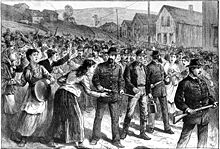
Back Union Busting German Represión sindical Spanish Répression antisyndicale French Pemberangusan serikat pekerja ID Union busting Italian Vakbondsonderdrukking Dutch Union busting Swedish Sendika karşıtlığı Turkish

Union busting is a range of activities undertaken to disrupt or weaken the power of trade unions or their attempts to grow their membership in a workplace.
Union busting tactics can refer to both legal and illegal activities, and can range anywhere from subtle to violent. Labor laws differ greatly from country to country in both level and type of regulations in respect to their protection of unions, their organizing activities, as well as other aspects. These laws can affect topics such as posting notices, organizing on or off employer property, solicitations, card signing, union dues, picketing, work stoppages, striking and strikebreaking, lockouts, termination of employment, permanent replacements, automatic recognition, derecognition, ballot elections, and employer-controlled trade unions.[1]
Article 23 of the Universal Declaration of Human Rights declares that everyone has a right to form or join a trade union.[2] The provision is, however, not legally binding and has, in most jurisdictions, no horizontal effect in the legal relation between employer and employees or unions.
| Part of a series on |
| Organized labor |
|---|
 |
There are many labor relations consultancies worldwide. They specialize in industries such as entertainment (radio, television and motion picture), hospitality (culinary and food service), communications, manufacturing, aerospace, utilities, and healthcare. Although many operate only in the United States, trade union organizing takes place multi-nationally. According to the AFL-CIO, "one of the largest U.S. firms, Labor Relations Institute (LRI),[3] offers a "Guaranteed Winner Package": if the corporation does not "win", it does not pay.[4] In both the US and Europe, organizing campaigns increasingly involve immigrant non-English speaking workers.[citation needed] Internationally, compliance with labor laws within developed countries can be vastly different from emerging countries. Both trade union organizers and management must know the law and avoid unfair labor practice (ULP) charges.
Application and adherence to labor laws may differ worldwide, but labor laws continue to expand into new countries such as the Labour Law of the People's Republic of China and the Indian labour law. Trade union organizing often starts with workers who are untrained or unaware of labour law. Due to the changing global and multinational employment environment and labor relations/employment laws, the modern labor movement turns more and more to professional guidance. Internationally, laws differ in how a bargaining unit is defined for workers with job descriptions involving supervision or management. Because the operative word is "law", trade unions and workplaces may retain legal counsel to navigate the complexities of local and/or international labor laws in order to avoid unfair labor practice charges.
- ^ *Smith, Robert Michael (2003). From blackjacks to briefcases: a history of commercialized strikebreaking in the United States. Athens OH: Ohio University Press. pp. 179. ISBN 978-0-8214-1466-8.
- Norwood, Stephen Harlan (2002). Strikebreaking & intimidation: mercenaries and masculinity in twentieth-century America. UNC Press. pp. 328. ISBN 978-0-8078-5373-3.
- Gall, Gregor (2003). "Employer opposition to union recognition". In Gregor Gall (ed.). Union organizing: campaigning for trade union recognition. London: Routledge. pp. 79–96. ISBN 978-0-415-26781-6.
- ITUC. "2010 Annual survey of violations of trade union rights". International Trade Union Confederation. Retrieved 13 June 2010.
- ^ "The Universal Declaration of Human Rights". Archived from the original on 2014-12-08. Retrieved 2022-09-22.
- ^ [Labor Relations Institute],"Union Avoidance Video | Guaranteed Winner «". Archived from the original on 2012-01-02. Retrieved 2012-01-14.
- ^ [AFL-CIO],"The Ugly Face of Union-Busting | AFL-CIO NOW BLOG". Archived from the original on February 23, 2012. Retrieved January 14, 2012.